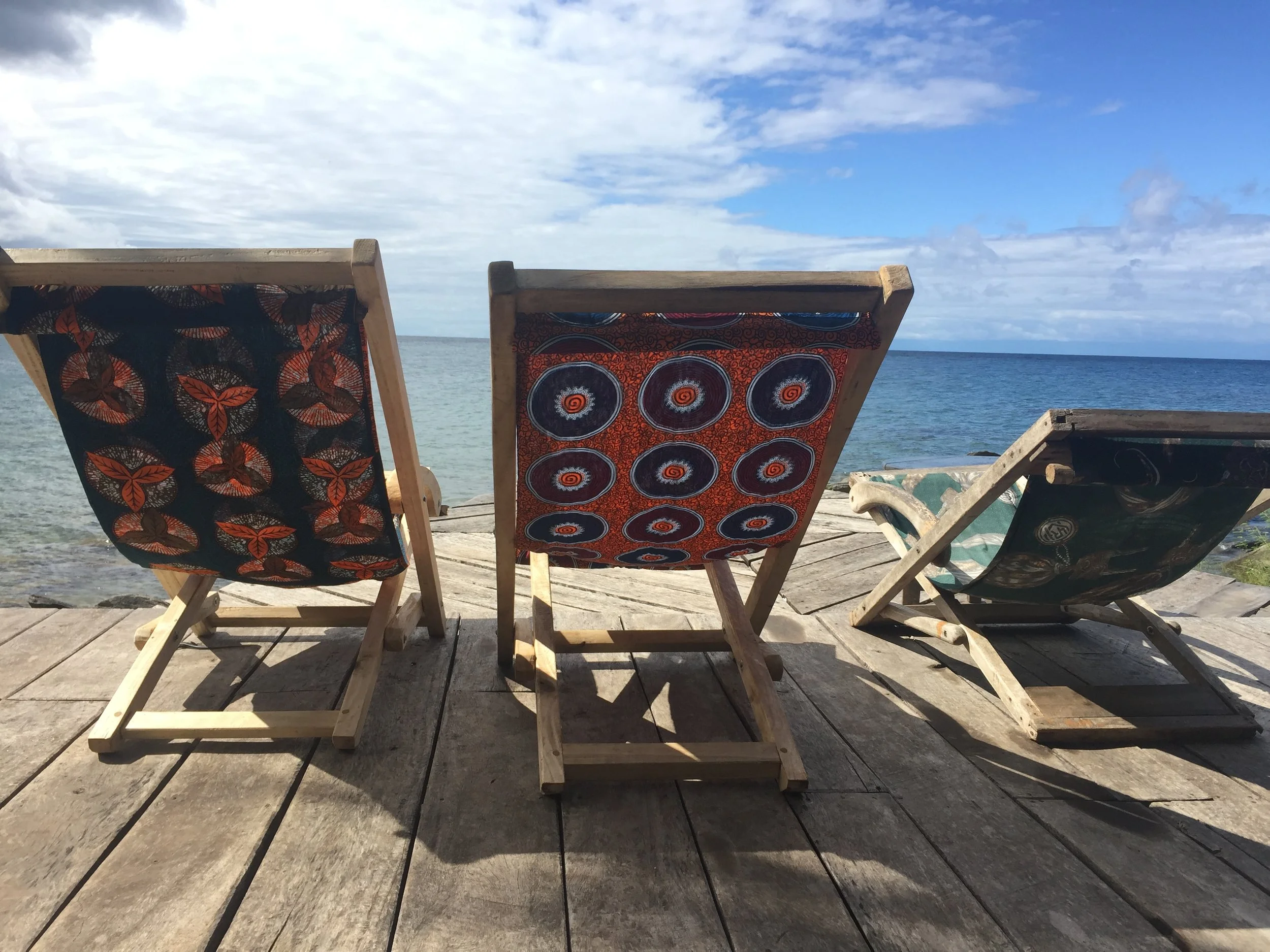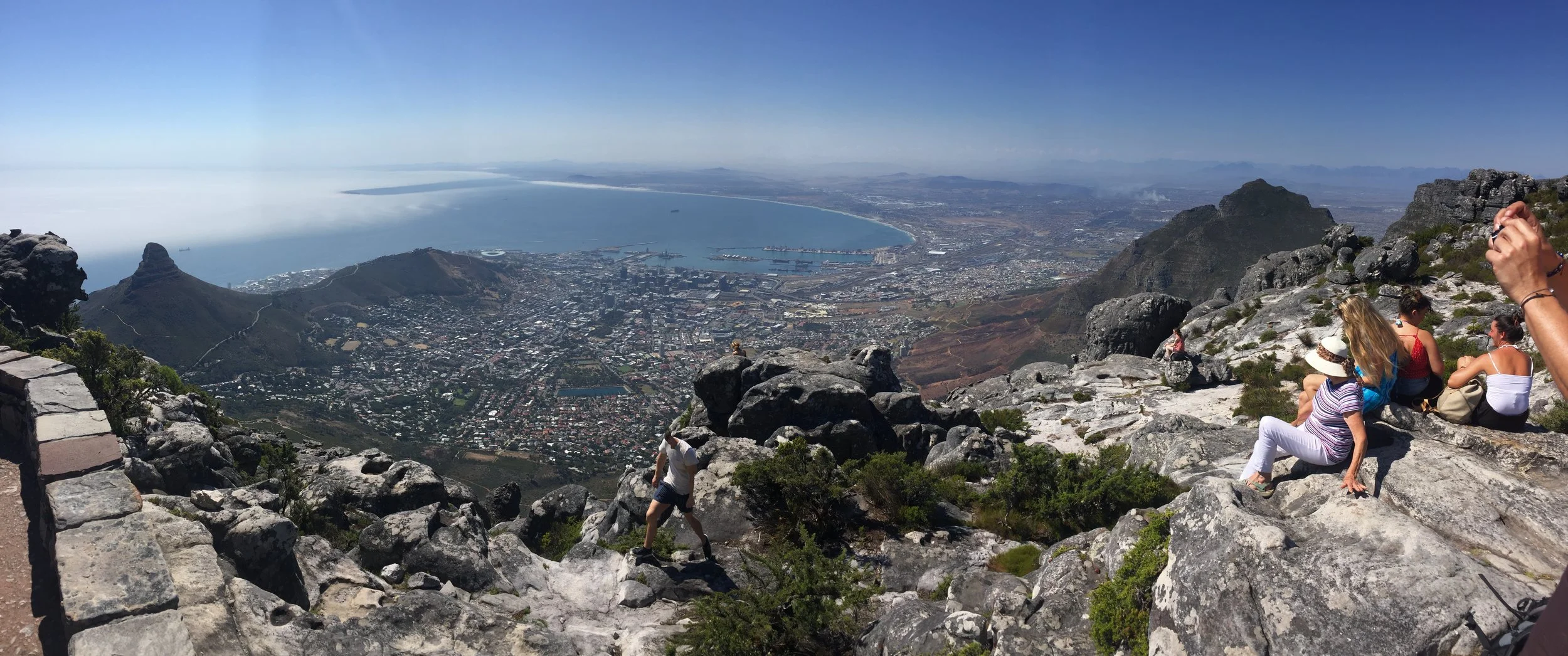Botswana

Botswana began as a "why not" stop on the trip for me. Not linearly relevant to traveling from Johannesburg to Dar es Salaam, I still wanted to visit Chobe National Park for a day safari. When it turned out I would have to replace my emergency passport yet again, I decided to take my chances in Gaborone instead of Harare.
The first stop was over the border from Victoria Falls in Chobe for a day safari. The Botswanan visa, normally free for Americans, immediately became the most expensive line-item on the trip, costing me $150 because of my travel on an emergency passport. $150! I'm still unclear whether the money was a legitimate policy expense or bought drinks for the immigration office staff that weekend.
In Kasane, outside of Chobe, while I was sitting on a stoop to do some work, I heard a rustle from beside me. I did a double take when I saw a gigantic warthog, maybe three feet in height, curiously looking over at my laptop. More startled than I was, when I turned to look at it, the warthog froze, backed up, and ran away into the alley behind me. Back home, bugs and the occasional squirrel interrupt me working outdoors. I'm not sure which I prefer.
From Kasane, I took the overnight bus to Gaborone, the capital and largest city in Botswana at 230k residents. As you take the bus to and from northern Botswana, you must get out at the midpoint of the country to stamp your feet in disinfectant and let guards search your bags for meat products. The north of the country is home to foot and mouth disease (which is apparently not the same as hand-foot-and-mouth disease?), spread by water buffaloes and severely dangerous - but only to animals with cloven hooves.
The safari crew takes our last group picture before I peel off for southern Botswana.
According to our guide, water buffalo are the most dangerous of the Big 5 in Botswana to hunt.
The country's president, Ian Khama, is the son of the ex-president Seretse Khama, the country's first president and most famous revolutionary leader. Unlike many multi-generational African leaders who are the progeny of past strongmen, Ian is well-liked by all the locals I talked to in Botswana. He retired from a coveted military position to run in fair and open elections, and was elected chairman of his party before becoming president.
Botswana is actually somewhat of an outlier in southern Africa for its successful history of transitional democracy and uninterrupted fair elections since its independence in 1966. In Chobe, I met a group of visiting HEC students who had done a trek to visit companies and entrepreneurs in Gaborone. They echoed the that the country's comparatively successful politics and, in particular, its active Ministry of Trade and Industry, which has for years successfully attracted foreign direct investment, have made Botswana a successful anomaly in Africa. All of this has given Botswana the highest HDI of sub-Saharan Africa (how Libya still ranks above Botswana is, for me, a head-scratcher.)
In Gaborone and Botswana in general, you do not see the same kind of begging and touting as Zimbabwe and South Africa. Maybe this is because the country is legitimately better off; or, maybe, because locals aren't used to western tourists because they get so few in their big cities.
Seeing a white girl walking alone through the crowded bus ranks in Gaborone made me do a double-take. The main bus station there is packed - it can only nominally be called a bus station. In between shuttles on the parking lot, small markets, taxis, street vendors, and hawkers all jockey for space. Impromptu stands spring up to sell shoes, clothes, and food to travelers. People hang out and blast the popular Radio Botswana from their cars. But there are no western travelers. Seeing her reminded me of talking about "the nod" with my old boss and friend Brian, who had transitioned from Morehouse straight into the world of investment banking at Lehman.
Gaborone itself reminds me of Novi Beograd - "New Belgrade" - the neighborhood I had visited and lived in for summers in Serbia growing up. Despite the name, there is not much new about Novi Beograd. The apartments are big blocs, built Soviet style for form over function, and the streets are all broad avenues. I think it's my time there as a young adult that explains why I like big, dirty cities. Walking around Gaborone reminded me of the smell of gasoline and sweat on the bus in the mornings as I'd commute to work at B92 or Serbian language classes.
The Zambezi river which runs through Chobe park.
Why hello there.
Anywhere you go in Botswana, Christian music follows you in the background. Like South Africa, there is something inescapably more genuine and heartfelt about the religious conviction that people express in Africa than the rote, formulaic religious participation back home.
At the National Museum in the capital, plaques are dedicated to President Ian Khama's proactive response to the HIV/AIDS crisis. Despite its high development, Botswana has suffered more than most countries from the epidemic, which is spurred on by the "virgin myth" (that having sex with a virgin will clear the infection) and "sugar daddy" phenomenon of young girls having older men as boyfriends. From a high of 65 years in 1990, the country's life expectancy dropped to just 35 - little more than half its peak - in 2005. In some areas, prevalence is still as high as 40%.
Yet President Khama was one of the first African leaders to recognize AIDS for the epidemic it was. Unlike South Africa's health minister Manto Tshabalala-Msimang, who advocated treating AIDS with garlic and alcohol, he invited international relief organizations into the country to help prevent transmission and treat symptoms.
Most buildings in downtown Gaborone seem to be international aid organizations.
The bustling outdoor mall and market in downtown Gaborone.
This view is pretty characteristic of Gaborone, which seems to consist mainly of wide open spaces and new office construction.
The JNG Express bus I took through Botswana, while not one of the infamous chicken buses that run up and down the continent, was not the Intercape I started my overland journey on either. Wedged tightly between two lethargic and indifferent commuters in a narrow seat without a recline, I managed to sneak a couple hours of sleep in on the overnight drives down and back. Heading to Gaborone, the bus stopped to honk noisily at a fully grown elephant and its family lazily crossing the road, in the middle of the night. On the way back to the Zambia border, it was a bull.
Nik / 5.10.17

















